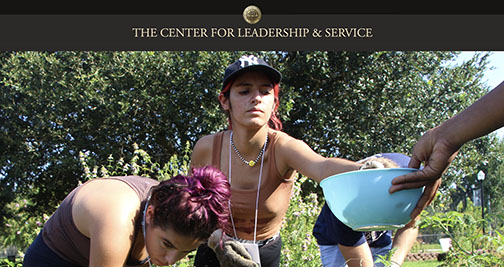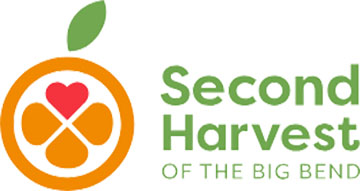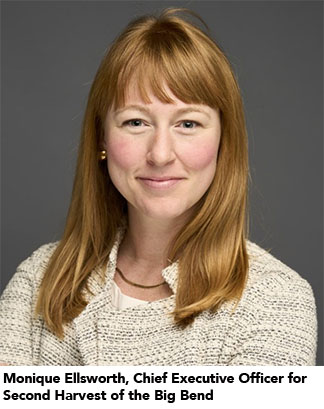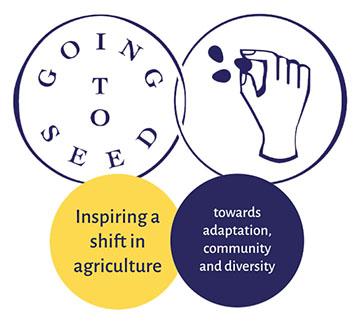Giving back: English major interns who work with nonprofits can use their storytelling skills to amplify marginalized voices
By Des Lewis
For Florida State English majors on the Editing, Writing, and Media track, an internship is necessary for graduation. As a guide for students, the department’s website showcases different types of organizations to help students on their journey to fulfill this requirement. These opportunities include organizations related to advertising, marketing and public relations, government offices, bookstores and galleries, online publications and newspapers, television and radio stations, among many others.
Most of these fields are ones expected for English majors to advance their skills; however, a less-common category showcased within the internship guide is that of nonprofit organizations.
Upon first glance, understanding how an internship with a nonprofit can enhance and fine-tune the skills of English students might be difficult. There is often a misconception that work with those groups include only activities involving physical labor, such as helping the homeless, working in food-insecurity areas, or beach clean-ups.
But nonprofits often seek out and need the skills English interns bring to the table. Directors of nonprofits greatly appreciate English students’ learned areas of expertise, such as rhetoric, communication, media competence, creative thinking, and storytelling.
Jesmel Moreno, an FSU graduate assistant working in The Center for Leadership and Service, says storytelling is one of the most important elements in community service and social change.
“It's more like, to amplify, right? Because it's not necessarily that these communities don't have voices, it's that they're often silenced,” Moreno says. “English majors are really good listeners and really good writers, and they can take those skills into these communities and open the conversation.”
Moreno urges those with storytelling ability to share that skill with the communities these organizations help, to facilitate the change these communities need. As trained storytellers, English majors can use their scholastic expertise to advocate for disenfranchised communities and to amplify the voices of the marginalized.
English Associate Lecturer Molly Hand, who also is the department’s internship coordinator, believes that English students have an inherent need to connect with others, because of their major of choice.
 “At least one of the reasons that I observe that students choose to major in English over another major, over marketing or communications maybe, is because they have a sense of wanting to do work in the humanities,” Hand says. “[They want to align] with one's personal values. . .do the kind of work where it feels like you're making some kind of difference in the world in various ways.”
“At least one of the reasons that I observe that students choose to major in English over another major, over marketing or communications maybe, is because they have a sense of wanting to do work in the humanities,” Hand says. “[They want to align] with one's personal values. . .do the kind of work where it feels like you're making some kind of difference in the world in various ways.”
Hand also cites English students' passion for humanities as a reason for nonprofit employers to want to work with them.
“From the employer side of things, I think the same is true,” she says. “Employers in nonprofits are interested in students in English because they are developing writing and editing skills. But the employers also see that students that are coming from an English background or humanities background do have that additional kind of value-driven sense of doing work that aligns with who they want to be and how they want the world to become.”
This “value-driven mission” is not the only reason why non-profits are seeking the work of English students, however. Many skills learned in a creativity-based classroom are beneficial to these organizations and are needed for their survival.
“It is 2023. Any kind of editorial writing, creative writing, or otherwise is absolutely necessary and it's what the people are looking toward now,” Moreno points out. “Somebody whose house doesn't have access to the internet might not be able to access certain resources. So, what do you do? An English major could create some kind of flyer infographic that could be distributed, and somebody who might not have had access now does have that access.”
In addition to improving access to resources, organizational and critical thinking skills benefit the behind-the-scenes work of nonprofits.
“Doing development work is important,” Hand says. “Helping to organize events, create fundraisers, and activities along those lines. All of that is more administrative work that's super valuable work that nonprofits really need. They don't exist without people doing that work.”
 In most internship positions, students are given flexible work that revolves around developing them professionally while benefiting the organization. Chief Executive Officer for Second Harvest of the Big Bend Monique Ellsworth loves the opportunity to develop FSU students’ skills base through internship opportunities.
In most internship positions, students are given flexible work that revolves around developing them professionally while benefiting the organization. Chief Executive Officer for Second Harvest of the Big Bend Monique Ellsworth loves the opportunity to develop FSU students’ skills base through internship opportunities.
"A student's volunteer engagement at Second Harvest is going to be built completely in a unique way related to what the students educational and personal interests are,” Ellsworth says. “I personally have a real true commitment to the student experience, recognizing that we can capture students' interest outside of the bubble that is FSU and engage them in the real world.”
 Ellsworth says she also believes it's important for students to become involved in community work to shape them into future changemakers.
Ellsworth says she also believes it's important for students to become involved in community work to shape them into future changemakers.
“Allowing them to utilize what book smarts they're developing into real-world application is crucial,” she explains. “I think it helps us grow our future; we're just investing in future leaders.”
In addition to creating future leaders, Second Harvest also needs English students for developmental departments within their organization. For example, Ellsworth describes the available internship positions centered on communication with people in need and other agencies.
“That includes our marketing, some of the letters we send out as solicitations for donations, blog posts, actions that we are working on behind the scenes to ensure that we're sharing our story and communicating with a variety of audiences,” Ellsworth says. “An English student’s skill set would be highly utilized and valuable at Second Harvest and a number of other nonprofits around our community.”
The beauty of majoring in English is how many opportunities a graduate has with an English degree. Interning with a nonprofit can expand those horizons and act as a platform to work with your passions.
“I do believe that once you can, there's a fire ready to be lit in all of our bellies, and it's usually getting outside of your comfort zone where you really find a moment that sparks a part inside of you that will never go away,” Ellsworth says. “Once it's lit, you can never ignore that light.”
That was the case for Lowell McCampbell, a senior English-Editing, Writing, and Media major, who is currently interning with Going to Seed, a national organization that offers volunteer opportunities. Going to Seed’s mission is to “inspire, shift in agriculture towards adaptation diversity and community and they are a relatively new,” according to McCampbell.
Going to Seed has not previously had any FSU student-interns because its nonprofit status is relatively new, but the organizers are quickly developing and planning for future projects.
McCampbell chose to intern with this organization because he has an interest in agriculture, which began after reading Masanobu Fukuoka’s The One-Straw Revolution: An Introduction to Natural Farming. Plants have always been important to McCampbell, though.
“My entire life, I've been very passionate about plants. I was trying to grow everything from seed that I could possibly get my hands on,” he says, reflecting on his time growing up. “I was just so enamored with plants, and many years have passed between then and when I volunteered on some local farms.”
Completing an internship with an organization that shares his values was important to McCampbell, and that connection further solidified his decision.
 “When I looked at the different internship opportunities, there were a lot in like advertising and social media and things like that—I wasn't really interested,” he says. “If I created the internship with Going to Seed, I would be doing a lot of work that would be helping them as an organization and that's something I really cared about. It would be the most meaningful work for me.”
“When I looked at the different internship opportunities, there were a lot in like advertising and social media and things like that—I wasn't really interested,” he says. “If I created the internship with Going to Seed, I would be doing a lot of work that would be helping them as an organization and that's something I really cared about. It would be the most meaningful work for me.”
Because of his English studies, specifically those centered on rhetoric, McCampbell can help Going to Seed in a unique way.
“My Rhetoric and the Article in Essay Technique classes have honestly been helpful,” McCampbell says. “Taking Visual Rhetoric has also been a big help. For example, seeing how the images we're using can be effective for people to inspire change towards our mission goals and things like that. Primarily in the rhetoric department, I see that a lot of things I can apply to Going to Seed and the things we're doing.”
Not only has he been able to benefit his organization, but he also has sharpened his English skills by working for Going to Seed.
“It's really shown me that there are a lot of different ways in which people write and end up with a writing piece,” McCampbell says. “You know, some people work with a team, some people do it completely solo and make a really wonderful polished piece. It's really encouraged me to use the department’s Reading-Writing Center, which has been a positive experience for me.”
Taking advantage of all the resources available to English majors is important for any student who takes on an internship. Those skills can then transfer to helping community members who lack important means and who are most in need.
For more information on how to get involved with non-profit organizations, visit the FSU English Department Internship tab on the website or visit the FSU Center for Leadership and Service.
Destany Lewis is a junior who is majoring in English-Editing, Writing, and Media.
Follow the English department on Instagram @fsuenglish; on Facebook facebook.com/fsuenglishdepartment/; and Twitter, @fsu_englishdept
